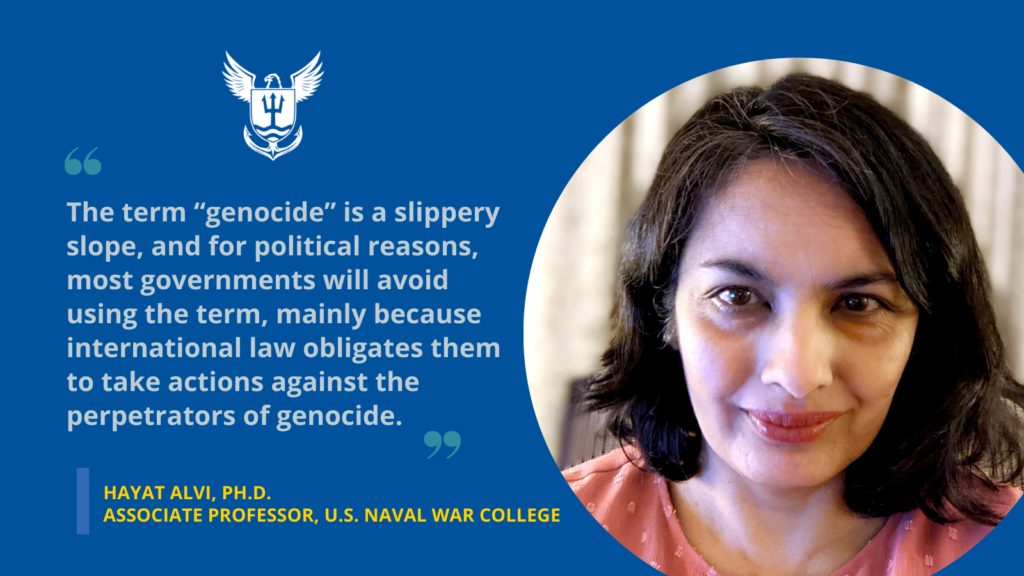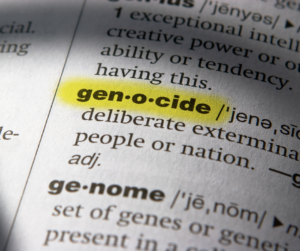
“It’s genocide.”
That’s what Ukraine President Volodymyr Zelensky has called the killings of civilians by Russian forces in the town of Bucha outside Kyiv, which was recently retaken by Ukrainian soldiers. Reports of bodies of people found shot in the head, some who appeared to have been bound by their hands and feet, drew international condemnation. But is the use of the term genocide warranted?
Not according to U.S. Naval War College Associate Professor of National Security Affairs Hayat Alvi, Ph.D. Her area of speciality includes genocide studies. The Naval War College Foundation reached out to Dr. Alvi for perspective on the question of whether Russia is committing genocide in Ukraine. Her response is below:
What Russia is doing in Ukraine is not genocide, according to international law. The official definition of genocide has both quantitative and qualitative components — and, it is important to note that the quantitative component has no specific number of victims associated with it mainly because it is a subjective judgment based on the combination of both the quantitative and qualitative data and stipulations as well as the forensic evidence obtained from analyzing atrocities.
Specifically, international law identifies genocide as involving a perpetrator’s intent to annihilate another group of people. Think of the Holocaust, for example, in which the Nazis willingly and overtly wanted to annihilate Jews and anyone else who didn’t fit their definition of a “pure” Aryan race. We see this clearly mentioned in Nazi literature, documents, records, Hitler’s speeches, his book Mein Kampf, and the actual strategic plan for the “final solution.”
The same can be applied to Turkey’s perpetration of the Armenian Genocide, the Cambodian Genocide (by the Khmer Rouge), and the current Rohingya Genocide (by Myanmar).
In the present context of Ukraine, it is clear that Putin/Russia does not want to annihilate Ukrainians, even though it might seem that way with all the atrocities we are witnessing. Actually, Putin and his regime want to remove/kill Ukraine’s President Zelensky and replace him with a pro-Putin president, like Putin/Russia did in Belorussia — the difference being that Putin miscalculated about Ukraine. Putin thought that achieving this in Ukraine would be easy, but instead he discovered that he would have to wage a war and violent occupation of territories in Ukraine to try to achieve his goal of replacing Zelensky with a pro-Putin/Russia puppet regime. Putin/Russia never anticipated such a fierce resistance by the Ukrainian people. Hence, the situation has precipitated into a bloody war.

So, Putin/Russia does not have an agenda to annihilate the Ukrainian people based on some racial, religious, or other kind of prejudice that drives the perpetrator to seek to “cleanse” society (i.e., the term “ethnic cleansing”) of the “undesirable” people. The Putin/Russian regime wants to annex territory to the Russian Federation in order to replicate the Soviet Union’s expansion and incorporate former Soviet satellite regions into its jurisdiction. Putin wants to re-create a new “Soviet empire.” And Putin wants the subjugation of the Ukrainian people to his will. What he has done in Ukraine is a combination of war crimes and crimes against humanity, but not genocide, in terms of the official international legal definition.
War crimes encompass targeting civilian and non-combatant populations, like in residential areas, with highly destructive weapons — which is what Russia has done in Ukraine. Crimes against Humanity encompass atrocities like what we see coming out of Bucha — civilians’ hands tied behind their backs and summarily executed, and also there is evidence of mass graves of civilians. Rape, torture, deprivation of basic necessities like food, water, etc., in war are all war crimes and crimes against humanity.
These are horrific crimes and atrocities, but applying the label of genocide requires all aspects and components of the official legal definition of the term. We have to consider Putin’s intent and strategic objectives, as well as his personal ambitions and views. He is not seeking purification of society; he is seeking the re-creation of the Soviet empire in the modern context — at whatever cost.
Putin and his henchmen deserve to be arrested and tried for war crimes and crimes against humanity. The term “genocide” is a slippery slope, and for political reasons, most governments will avoid using the term, mainly because international law obligates them to take actions against the perpetrators of genocide. Almost everyone wants to avoid committing resources and troops for that purpose.
Lastly, perpetrators of genocide seek to establish a utopian society upon achieving the “purification” of their territories. A utopia is an ideal or perfect society as viewed and promoted by a specific ideology (secular or religious) — for the Nazis, it was an Aryan race-based society that completely follows the Nazi ideology and implements Nazi policies. Anyone who does not abide by that ideology is deemed an enemy and a threat to the status quo of that system and regime. Anyone who does not fit the criteria of that ideal society is a “misfit” and even “subhuman” and must be eliminated. That is what happens in a genocide.
Genocide means that both quantitative and qualitative components must apply to the victim/perpetrator equation, as the international legal definition mandates. Historically, there are some clear-cut examples of genocide. Russia’s invasion of Ukraine is not a genocide for the reasons I explain above.
U.S. Naval War College Associate Professor Hayat Alvi, Ph.D., organized the College’s fourth annual genocide studies conference, held virtually last October. You can watch the proceedings here. Her views here are solely her own and do not represent the opinions and beliefs of the USNWC.
